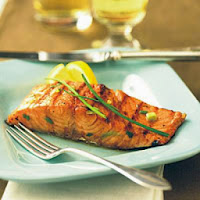According to Aaron McNevin, Director of Aquaculture for the World Wildlife Fund (WWF), "Depending on where you live, there is no industrial hunting anymore. Large buffalo herds no longer roam the prairie, and wild fish populations, many of which are threatened, may be going the way of the buffalo." Thus, we have aquaculture, better known as "fish farming". Fish farming is the process of breeding, raising, and harvesting animals in all types of water environments, such as ponds, rivers, lakes and oceans. According to the Food and Agriculture Association, aquaculture provides the world with 148 million tons of fish per year. The leading aquaculture import to the United States is shrimp, followed by Atlantic salmon, tilapia and shellfish.
We will have more on aquaculture over the next few days.




.jpg)












